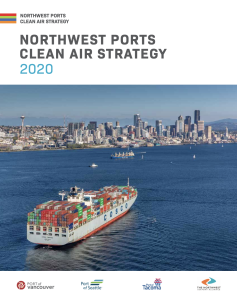Air emissions readily cross municipal, regional and national boundaries, which is why we work collaboratively with many others to monitor and address port-related air emissions that affect air quality and contribute to climate change.
In partnership with the port authorities of Seattle, Tacoma, and the Northwest Seaport Alliance, we established the Northwest Ports Clean Air Strategy in 2007 to improve air quality and reduce emissions of both greenhouse gases (GHGs) and diesel particulate matter (DPM) in the Georgia Basin-Puget Sound air shed.
Renewed in 2020, the strategy outlines our shared goal to phase out all port-related emissions by 2050 by transitioning port activities away from fossil fuels and towards cleaner, lower-emission fuels and technologies. To meet this goal, the strategy focuses on three key focus areas:
- Implementing programs that promote equipment efficiency, phase out old high-emitting equipment, and support lower emission interim fuels
- Facilitating collaboration to advance commercialization of zero-emissions equipment and enable adoption before 2050
- Collaborating with industry and government to identify and address key infrastructure constraints by 2030
The strategy also includes performance targets for each of the primary port emissions sources, including ocean-going ships, harbour boats, cargo-handling equipment, container trucks, locomotives and port administrative operations.
One of the performance targets is to track the number of ships calling at each port with improved engines or using shore power, cleaner fuels or other emissions-reducing technologies. This target was created to recognize the importance of port authorities in supporting shipping companies to adopt fuels or technologies that reduce emissions beyond those required by the International Maritime Organization for the North American Emission Control Area. We track the ships that meet or exceed environmental best practices through our EcoAction Program.
- Northwest Ports Clean Air Strategy [PDF]
- 2022 Progress report: Northwest Ports Clean Air Strategy [PDF]
Thank you for your interest in the Port of Vancouver. For more information or reports from prior years, please contact us at [email protected] or 604 665-9000.
